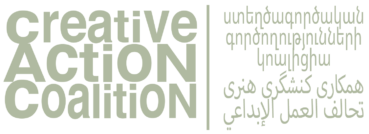Creative Action Coalition (CAC) was launched in March 2023. We are dedicated to building international solidarities for global resistance to systemic oppressions through art projects, exhibitions and events. CAC is inclusive of all artists whose indigenous communities and cultural identities have suffered the consequences of imperialism, invasions, settler societies, and colonization.
As a coalition-building artist group, we have recently launched a campaign to expand our team, and create international partnerships with other artist collaboratives, arts spaces and organizations. Please see the details on how you could join us, at this link…. Following is a list of CAC’s current members and organizers.
Our current members are:
Alysse Stepanian
Dena Al-Adeeb
HK Zamani
Lusine Djanyan
Massa Lemu
Srboohie Abajian
Zaven Ovian
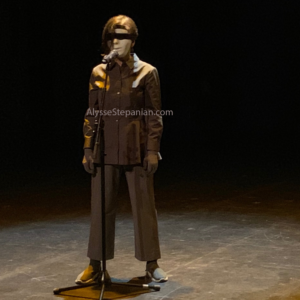 *Alysse Stepanian is an Armenian-American, Iranian-born cross-media artist, independent curator and human and “animal” rights advocate. Her creative work, research and writings are focused on the effects of nationalism and politics of fear, and the importance of intersectionality in fighting injustices. Stepanian has exhibited in 50 countries, and has lectured about interconnected oppressions concurrent with her co-curated exhibition of video art by 20 Iranian women, “Nietzsche Was A Man”, at the Pori Art Museum in Finland, Malmö Konsthall in Sweden, and Museo Ex Teresa Arte Actual in Mexico City. Her latest collaborative multimedia performance was presented at the Instants Vidéo Numériques et Poétiques Festival in Marseille. She is the creator and curator of Manipulated Image video art screenings and multimedia events, and URBAN RANCH PROJECT, an “animal” advocacy and social and environmental activism arts venue based on Facebook that was a 2013 recipient of Culture & Animals Foundation Multi-media Research Grant. Stepanian’s collaborations include multimedia installations created with Philip Mantione under the name BOX 1035 during residencies at Kunsthaus Tacheles/Berlin, Imagine Gallery/Beijing, and Islip Art Museum/New York.
*Alysse Stepanian is an Armenian-American, Iranian-born cross-media artist, independent curator and human and “animal” rights advocate. Her creative work, research and writings are focused on the effects of nationalism and politics of fear, and the importance of intersectionality in fighting injustices. Stepanian has exhibited in 50 countries, and has lectured about interconnected oppressions concurrent with her co-curated exhibition of video art by 20 Iranian women, “Nietzsche Was A Man”, at the Pori Art Museum in Finland, Malmö Konsthall in Sweden, and Museo Ex Teresa Arte Actual in Mexico City. Her latest collaborative multimedia performance was presented at the Instants Vidéo Numériques et Poétiques Festival in Marseille. She is the creator and curator of Manipulated Image video art screenings and multimedia events, and URBAN RANCH PROJECT, an “animal” advocacy and social and environmental activism arts venue based on Facebook that was a 2013 recipient of Culture & Animals Foundation Multi-media Research Grant. Stepanian’s collaborations include multimedia installations created with Philip Mantione under the name BOX 1035 during residencies at Kunsthaus Tacheles/Berlin, Imagine Gallery/Beijing, and Islip Art Museum/New York.
In August 2023, Stepanian wrote an Open Letter to Amy Goodman of Democracy Now!, asking her to break her silence and her participation in the baffling media blackout that continues to embolden Baku’s dictatorial regime to push his extremely aggressive and Armenophobic policies, which began with blockade and starvation for over nine months, and ended with bombardment and complete ethnic cleansing of Artsakh/ Nagorno-Karabakh, of its Indigenous Armenian population.
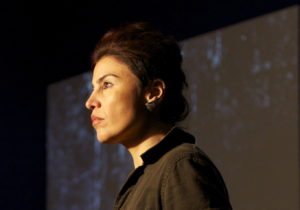 *Dena Al-Adeeb is an Iraqi born feminist scholar-activist, artist-cultural worker, educator, community organizer, and mother. Her transdisciplinary research is at the intersection of U.S. imperial war geographies, militarism, and extractive capitalist economies in West Asia with an emphasis on visual, material, and petro-culture of the Arab/Muslim worlds.
*Dena Al-Adeeb is an Iraqi born feminist scholar-activist, artist-cultural worker, educator, community organizer, and mother. Her transdisciplinary research is at the intersection of U.S. imperial war geographies, militarism, and extractive capitalist economies in West Asia with an emphasis on visual, material, and petro-culture of the Arab/Muslim worlds.
Dena’s creative practice explores gendered histories and lived experiences of war, refugee narratives and collective memory, affect and embodied healing practices through a decolonial framework. Her artwork takes on varied practices including live art, video art, installation, digital art, photography, text, and activism. She creates performative, relational works, dedicated to participatory art, socially engaged projects, collaborative engagement, and the cultivation of solidarity. Dena’s work appears in a diversity of publications and shown globally in spaces ranging from national museums to abandoned buildings. She curates DIWAN: SWANA Futurisms and is a member of the Palestinian Feminist Collective and HEKLER Collective.
Dena is a recipient of numerous awards including a Mellon Artist and Practitioner fellowship at the Yale Center for the Study of Race, Indigeneity, and Transnational Migration as well as the University of California President’s Postdoctoral Fellowship. She has undertaken many academic research positions throughout her career including her role as Senior Fellow at the Käte Hamburger Center for Apocalyptic and Post-Apocalyptic Studies at the University of Heidelberg and Visiting Scholar at the Department of American Studies at the University of California at Davis. Dena has taught at New York University, Pratt Institute, San Francisco State University, and Expression College for Digital Arts. Dena holds a Ph.D. in Middle Eastern and Islamic Studies, Culture and Representation from New York University, M.A. in Sociology-Anthropology from the American University in Cairo, and a B.A. in International Relations from San Francisco State University.
 *HK Zamani (b. 1958, Tehran-Iran) studied Studio Arts and Design at California State University, Dominguez Hills and El Camino Community College. He received his Master’s of Fine Art in Painting from Claremont Graduate University. Selected regional exhibitions include Los Angeles County Museum of Art, Lancaster Museum of Art and History, A+D Museum, PRJCTLA, LA Louver, Municipal Gallery at Barnsdall. He has also exhibited nationally and internationally in New York, San Francisco, Chicago, London, Berlin, Prague, Seoul, Saigon, and Bangkok. He is a multidisciplinary artist, educator, and founder of PØST, an alternative exhibition space in Los Angeles (1995-2018), where more than five hundred exhibits were hosted. He has taught at University of California Los Angeles, University of California Santa Barbara, California State University at Long Beach, California State University at Dominguez Hills, Woodbury University, and has been a Visiting Artist at numerous national and international institutions. He is a recipient of The City of Los Angeles Individual Master Artist Project (COLA-IMAP) and California Community Foundation grants, and his work is in the collections of Los Angeles County Museum of Art, Berkeley Museum of Art, and Lancaster Museum of Art and History.
*HK Zamani (b. 1958, Tehran-Iran) studied Studio Arts and Design at California State University, Dominguez Hills and El Camino Community College. He received his Master’s of Fine Art in Painting from Claremont Graduate University. Selected regional exhibitions include Los Angeles County Museum of Art, Lancaster Museum of Art and History, A+D Museum, PRJCTLA, LA Louver, Municipal Gallery at Barnsdall. He has also exhibited nationally and internationally in New York, San Francisco, Chicago, London, Berlin, Prague, Seoul, Saigon, and Bangkok. He is a multidisciplinary artist, educator, and founder of PØST, an alternative exhibition space in Los Angeles (1995-2018), where more than five hundred exhibits were hosted. He has taught at University of California Los Angeles, University of California Santa Barbara, California State University at Long Beach, California State University at Dominguez Hills, Woodbury University, and has been a Visiting Artist at numerous national and international institutions. He is a recipient of The City of Los Angeles Individual Master Artist Project (COLA-IMAP) and California Community Foundation grants, and his work is in the collections of Los Angeles County Museum of Art, Berkeley Museum of Art, and Lancaster Museum of Art and History.
HK Zamani’s new works, Inadvertent Protagonists, allow for an unpredictable shifting of possibilities and imaginings in a dialogue between painting and sculpture. Mirroring, through their various juxtapositions, the cultural duality and overlap he brings to his work.
His Fashion Erasures challenge class consciousness, standardization and expectation. The obscuring of found images cancels their conventional orthodoxies while embellishing and empowering them to suggest both their primal origins and a potential undiscovered future. Edifice/Oedipus series is the convergence of Inadvertent Protagonists and Fashion Erasures, as well an excavation of the artist’s past.
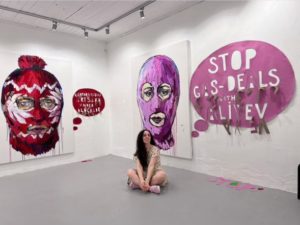 *Lusine Djanyan is an artist, Pussy Riot activist, and a political refugee living in Sweden. As a child Lusine fled Azerbaijan with her family during the Armenian pogroms of 1988. Then again in 2017 she fled Russia with her husband and child, in order to avoid persecution — her husband is also a Pussy Riot activist. While in Russia, in 2013 Djanyan’s involvement and activities in the resistance movement against the 2008 invasion of Georgia led to her dismissal from her lecturer position at the Krasnodar State University of Culture and Arts. Lusine has stated, “My art is about struggle against two dictatorial regimes. One is Putin’s regime, the other one is Aliyev’s regime. Both dictators destroyed my life”.
*Lusine Djanyan is an artist, Pussy Riot activist, and a political refugee living in Sweden. As a child Lusine fled Azerbaijan with her family during the Armenian pogroms of 1988. Then again in 2017 she fled Russia with her husband and child, in order to avoid persecution — her husband is also a Pussy Riot activist. While in Russia, in 2013 Djanyan’s involvement and activities in the resistance movement against the 2008 invasion of Georgia led to her dismissal from her lecturer position at the Krasnodar State University of Culture and Arts. Lusine has stated, “My art is about struggle against two dictatorial regimes. One is Putin’s regime, the other one is Aliyev’s regime. Both dictators destroyed my life”.
Lusine has presented her “freedom of speech” statement at the Grammis-2022 in Sweden. In September 2023 she co-wrote an article with Azerbaijan-born activist, Zhala Bayramova, asking the Nobel Foundation to withdraw the invitation for Azerbaijan in its ceremony, because of its human rights violations, and its blockade and ethnic cleansing of the Indigenous Armenians of Nagorno-Karabakh— a request that was ignored due to political reasons. Bayramova is the daughter of the human rights defender, Gubad Ibadoghlu, who has been imprisoned by Azerbaijan’s authority — one of the countless human rights violations that have been condemned as politically motivated by the international community.
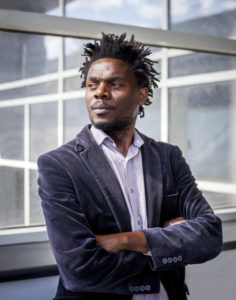 *Massa Lemu is a Malawian visual artist and writer whose multi-disciplinary artistic practice takes the form of drawing, performance, and multimedia installations that are concerned with the contradictions of migration within globalization and the effects of an increasingly immaterialized, flexible and mobile capitalism on the post-colonial subject. Lemu’s text-based work features techniques such as quotation and détournment to tap on the critical possibilities of the polyglot nature of communication in postcoloniality. As a writer, Lemu’s scholarly interests lie in what he calls a biopolitical collectivism in contemporary African art, i.e. a socially engaged, subject-centered, and life-forming collectivist aesthetics. His writing has been published by Third Text, the Stedelijk Studies Journal, artandeducation.net (E-Flux), Center for Contemporary Art Lagos, and Contemporaryand (C&). Lemu has a PhD (Visual Arts) from Stellenbosch University, South Africa. Lemu is the co-founder of the Ozhopé Collective, and a tenured professor in Sculpture and Extended Media at the School of the Arts at Virginia Commonwealth University. He has a PhD (Visual Arts) from Stellenbosch University, South Africa.
*Massa Lemu is a Malawian visual artist and writer whose multi-disciplinary artistic practice takes the form of drawing, performance, and multimedia installations that are concerned with the contradictions of migration within globalization and the effects of an increasingly immaterialized, flexible and mobile capitalism on the post-colonial subject. Lemu’s text-based work features techniques such as quotation and détournment to tap on the critical possibilities of the polyglot nature of communication in postcoloniality. As a writer, Lemu’s scholarly interests lie in what he calls a biopolitical collectivism in contemporary African art, i.e. a socially engaged, subject-centered, and life-forming collectivist aesthetics. His writing has been published by Third Text, the Stedelijk Studies Journal, artandeducation.net (E-Flux), Center for Contemporary Art Lagos, and Contemporaryand (C&). Lemu has a PhD (Visual Arts) from Stellenbosch University, South Africa. Lemu is the co-founder of the Ozhopé Collective, and a tenured professor in Sculpture and Extended Media at the School of the Arts at Virginia Commonwealth University. He has a PhD (Visual Arts) from Stellenbosch University, South Africa.
 *Srboohie Abajian is an Armenian-American artist and a native of Armenia, where she earned her MFA in Painting from the National Academy of Fine Arts. Her projects focus on finding creative solutions that empower communities at risk. She uses her art as a tool to shape consciousness and effect social change. Srboohie writes, “For me, the choices people make are a never-ending source of fascination—and sometimes outrage. I want to confront my viewer with these thought-provoking questions: ‘Could this be me?’ and ‘Can I change this?’” As an immigrant, Srboohie was surprised by American society’s addiction to overconsumption. Her “Getting It” and “Finding Value” projects address this issue.
*Srboohie Abajian is an Armenian-American artist and a native of Armenia, where she earned her MFA in Painting from the National Academy of Fine Arts. Her projects focus on finding creative solutions that empower communities at risk. She uses her art as a tool to shape consciousness and effect social change. Srboohie writes, “For me, the choices people make are a never-ending source of fascination—and sometimes outrage. I want to confront my viewer with these thought-provoking questions: ‘Could this be me?’ and ‘Can I change this?’” As an immigrant, Srboohie was surprised by American society’s addiction to overconsumption. Her “Getting It” and “Finding Value” projects address this issue.
The prestigious Puffin Foundation has supported Srboohie’s public art projects multiple times. Her work is in the permanent collections of the State Department’s “Art in Embassies” program and at the Center for the Study of Political Graphics.
Srboohie keeps expanding her practice, moving from gallery exhibitions to outdoor public spaces. Her innovative sculptures, posters, and installations reach broader audiences, who can experience art on an everyday basis. In 2023, she has focused on social-engagement in her practice, reaching marginalized communities in war-torn villages of Armenia, near the Azerbaijani border. Srboohie believes, “There is injustice in the world, and it’s up to us to try and fix that. To me, the purpose of art is to preserve and maintain humanity in the world.”
 *Zaven Ovian is a theater actor, poet, and aspiring playwright of Armenian descent. He was born and raised in Massachusetts and based in New York City. He holds a BFA in theater from the Boston Conservatory.
*Zaven Ovian is a theater actor, poet, and aspiring playwright of Armenian descent. He was born and raised in Massachusetts and based in New York City. He holds a BFA in theater from the Boston Conservatory.
Over the past decade, Zaven has worked in theater around New England and in New York/New Jersey, uplifting several SWANA voices in a number of his roles. His performances include Émilie (the Flea Theater), Selling Kabul (Premiere Stages at Kean), Romeo & Juliet, The Band’s Visit, and Rosencrantz and Guildenstern Are Dead (Huntington Theater), and English (SpeakEasy Stage), among others. Portraying the lives of so many SWANA communities has only added to his belief in the intersectionality our communities must work to uphold in order to free us all of racial and ethnic oppression.
His poetry and plays are inspired by the great spirituality of the Armenian people and of all peoples of West Asia, the Middle East, and North Africa, recognizing the interconnected struggle inherently attached to us through Palestine, Syria, Lebanon, Iran, Egypt, and so many other places where the Armenian diaspora has placed its roots post-genocide. The impetus to write came from his constant work with new playwrights and new play workshops mixed with his desire to tell Armenian stories, which in the theater world are very few and far between. The lack of representation for the Armenian community in theater results in almost no roles for any Armenian actors to portray. Therefore, he says “we must write our own stories so that we can have an accurate representation and equal opportunity to finally play ourselves onstage. It’s time the world met the incredible resolve of the Armenian people and the incredible theatrical talent we have to offer.” He is a proud descendant of Armenian Genocide survivors.
